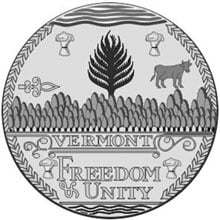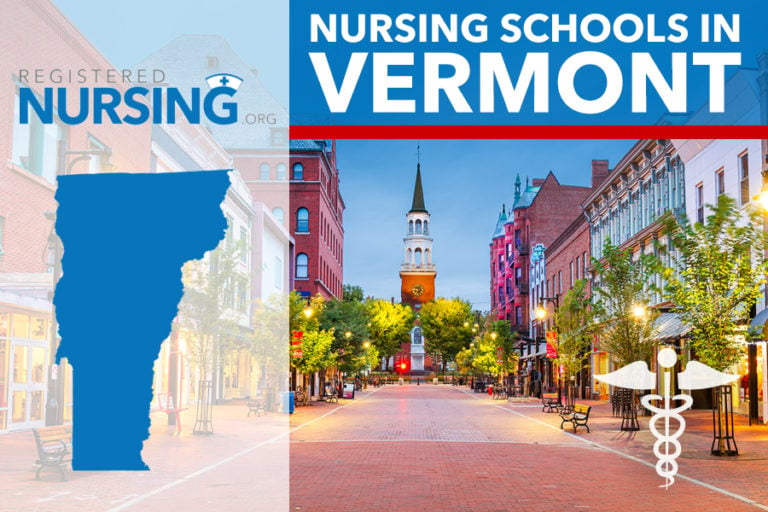Vermont may be one of the nation’s smallest and least populated states, but for what it lacks in size, it makes up for it in natural beauty and tight-knit communities. It’s also well-known for having a large number of nursing programs and a positive outlook for future nurses. Within the next ten years, Vermonters are expecting an increase of 10% in nursing jobs due to the ongoing nursing shortage and an aging population in the state. If you’re hoping to become a nurse in Vermont, below are a few degree programs that you can find in the state and the differences between them.
Jump to:
- Vermont RN Programs – Diploma, ADN, and BSN Degrees
- Advanced Practice RN & Nurse Practitioner Programs
- Getting an RN License in Vermont
For RN bridge programs visit:
Cities in Vermont

Vermont Nursing RN Programs – Diploma, ADN, and BSN Degrees
If you’re beginning your journey in nursing, you’ll need to choose an entry-level degree. In Vermont, there are three common paths for aspiring nurses: an Associate’s Degree in Nursing (ADN), a nursing diploma, or a Bachelor of Science in Nursing (BSN). Here’s a breakdown of what each option offers:
Comparing RN Diploma vs. LPN-to-RN vs. ADN Programs
If you’re looking to quickly enter the nursing field, nursing diploma or ADN programs are excellent options. These programs typically take one to two years to complete and provide the essential training needed to begin your nursing career. For those already working as an LPN, an LPN to RN bridge program might be a great fit. These programs leverage your existing experience, allowing you to earn either an ADN or BSN in a shorter timeframe than traditional routes while preparing you to become a licensed RN.
Common admissions requirements for ADN and diploma programs in Vermont include:
- High School Diploma or GED
- Minimum GPA, typically 2.5 or higher
- Some programs require scores from the TEAS (Test of Essential Academic Skills) or HESI Admission Assessment
For further admissions requirements and more information, check out our page on ADN degree programs.
More information on RN diplomas, LPN to RN, and ADN programs:
| Program | Estimated Tuition | Estimated Credits | Online Availability |
|---|---|---|---|
| ADN | $6,000 – $15,000 | 60-72 credits | Limited online courses, primarily on-campus |
| LPN to RN | $4,000 – $10,000 | 30-45 credits | Often hybrid; some online courses |
| RN Diploma | $5,000 – $12,000 | 40-60 credits | Rarely online; primarily on-campus |
ADN, LPN to RN, and nursing diploma programs require hands-on clinical training hours under supervision in order to be eligible for RN licensure. These will need to be completed in person, even if you opt for an online or hybrid program. Not sure if you’re ready for an RN career? Consider an LPN or CNA program in Vermont.
Comparing Traditional BSN vs. RN-to-BSN vs. ABSN Programs
If you’re seeking more comprehensive training than an ADN or nursing diploma can provide, a Bachelor of Science in Nursing (BSN) is an excellent option. A BSN can be pursued through several pathways. For those with no prior education or nursing experience, the traditional four-year BSN route is the way to go. However, if you already have an ADN and nursing experience, an RN to BSN program can allow you to complete your degree in less than three years. Additionally, if you hold a bachelor’s degree in a non-nursing field, an Accelerated BSN (ABSN) program offers a fast-track option to earn your BSN in a shorter time.
Admissions requirements for BSN programs in Vermont typically include:
- High School Diploma or GED
- Minimum GPA of 2.5-3.0
- Completion of prerequisite courses
For more information on BSN admissions requirements and more, see our BSN degrees page.
Several alternative pathways are also available to qualified students who want to pursue a BSN. Compare your options below:
| Program | Length | Estimated Tuition | Entrance Level |
|---|---|---|---|
| Traditional BSN | 4 years (120-126 credits) | $20,000 – $50,000 | First-time college students |
| RN to BSN | 1-2 years (30-35 credits) | $10,000 – $20,000 | Licensed RNs with an ADN |
| ABSN | 12-18 months (50-60 credits) | $25,000 – $40,000 | Non-nursing bachelor’s degree holders |
RN to BSN
A Vermont RN to BSN is a great option for nurses who are already licensed and have some experience in the field. This bridge program allows you to earn your BSN in a shorter time compared to a traditional BSN program. To qualify, you’ll need an associate’s degree in nursing (ADN) and an active RN license.
Accelerated BSN (ABSN)
Even if you have no prior nursing experience, you can still take a faster route to earning your BSN. If you already hold a bachelor's degree in a field other than nursing, you can complete a Vermont ABSN programs in as little as one year!
Advanced Practice RN & Nurse Practitioner Programs
Whether you’re an experienced nurse looking to advance your career or a student aiming for a higher level of nursing, Vermont offers several graduate-level nursing programs, including the Master's of Science in Nursing (MSN), a Nurse Practitioner (NP) program, a bridge program to enter advanced practice, or even a doctorate degree such as a Doctor of Nursing Practice (DNP), for those aiming for the highest level of education in nursing. To get started, you’ll need a BSN or MSN, along with an active, unencumbered RN license.
Earning a graduate-level degree in nursing opens the door to numerous Advanced Practice Registered Nursing (APRN) roles, leadership roles, and even careers in academia or research. Read more about APRN pathways in Vermont:
- Vermont Nurse Practitioner Programs
- Vermont MSN Program
- Vermont Accelerated MSN Program
- Vermont RN to MSN Programs
- Vermont Post Master’s Nursing Certificate Programs
- Vermont DNP Programs
Getting an RN License in Vermont
After graduating, the next step to becoming a licensed nurse in Vermont is to pass the NCLEX-RN exam. Once you've passed, you'll need to submit an application to the Vermont Board of Nursing, along with the required fee. To maintain your license, you will also need to complete any continuing education requirements set by the state.
Requirements for RN Licensure in Vermont
- Completion of an accredited RN program (ADN or BSN)
- Passing the NCLEX-RN exam
- Application to the Vermont Board of Nursing
- Renewal: 36 hours of CE every three years for license maintenance
Why Choose an Accredited RN Program?
The answer is straightforward: without attending an accredited nursing program, you won't be eligible for licensure. RN program accreditation ensures that the program meets the standards set by the state board, which is responsible for licensure. As you research nursing schools, make sure that the programs you're considering are accredited by recognized organizations, such as the Accreditation Commission for Education in Nursing (ACEN) and the Commission on Collegiate Nursing Education (CCNE)). This is a crucial step in your path to becoming a licensed nurse.

